Recent Blog Posts
WHY SHOULD SOMEONE ARRESTED FOR DRIVING UNDER THE INFLUENCE REQUEST A HEARING FROM THE DMV?
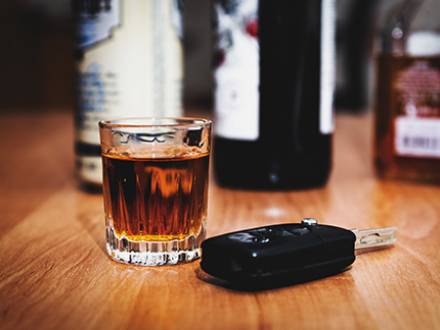 In short, because at the very least it puts the timing of the suspension in your hands and you do not know your chances at a DMV hearing until you get the reports.
In short, because at the very least it puts the timing of the suspension in your hands and you do not know your chances at a DMV hearing until you get the reports.
When arrested for a DUI you usually have your license confiscated and you are given a pink temporary license that is valid for 30 days. If you do not call DMV within 10 days to request a hearing you will be automatically suspended – even without a hearing. The DMV runs on a "presumed guilty" protocol.
This DMV process is in addition to, and separate from, the court process. Many people think that they are in America thus presumed innocent, that they have a court date and they will be able to address license issues in court. Despite being in the land of the free, DMV is allowed to run their "presumed guilty" scheme. If you do not call to set up a DMV hearing, you will be automatically suspended. It is smart to request that hearing – they will place a hold on the suspension, thus allowing you to drive after 30 days and until the outcome of the hearing. They will send you the reports – this often takes 4-6 weeks – and at that point you can evaluate whether to go through with the hearing. You can always decide to cancel the hearing. You can’t, however, wait to see the reports and then request a DMV hearing. It will be too late. The correct number to request a DMV hearing: 833-543-7703.
I GOT A DUI IN SANTA CRUZ, NOW WHAT?
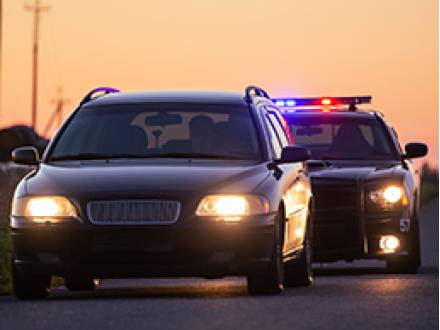 If you’ve just been arrested for driving under the influence in Santa Cruz, you likely spent the night (or at least a few hours) at the "sobering center" and were released with a ticket (smaller yellow piece of paper listing the charges against you) and a temporary driver’s license (pink piece of paper with lots of words in tiny font). Now what?
If you’ve just been arrested for driving under the influence in Santa Cruz, you likely spent the night (or at least a few hours) at the "sobering center" and were released with a ticket (smaller yellow piece of paper listing the charges against you) and a temporary driver’s license (pink piece of paper with lots of words in tiny font). Now what?
The temporary license is a valid license (assuming you had a valid license prior to the arrest) for the next 30 days. It informs you that if you do not call DMV within 10 days to set up a hearing your license will be automatically suspended after those 30 days. The paper then gives a Sacramento number to call and request a hearing. That number is a ten minute plus recording that will simply confuse you – and there is no option to request a hearing. The correct number to call and request a hearing is (833) 543-7703. In almost all cases it makes sense to request a hearing from the DMV, even when you think there is no hope of winning.
REINSTATING A DRIVER’S LICENSE AFTER A SUSPENSION: PAY ATTENTION TO THE DETAILS OR PREPARE TO WAIT IN LINE AT DMV MORE THAN ONCE
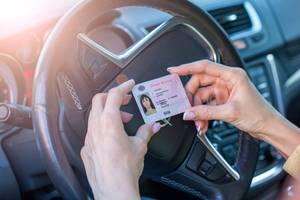 When one is convicted of violating Vehicle Code section 23152(a) or 23152(b), or loses the DMV hearing related to a DUI arrest, a license suspension follows. Reinstating the license often involves showing DMV proof of enrollment in DUI classes, an SR-22 (a special certificate of insurance), and an IID (ignition interlock device). In their wisdom, DMV requires that the SR-22 and the proof of enrollment in DUI classes be submitted electronically from the folks who provide those things. Proof of IID, however, is done by showing a written certificate. Once the driver has corralled all of these, they go to DMV, pay a reissue fee (not a small sum, could be as much as $250.00), and get their license reinstated. Seems easy, right?
When one is convicted of violating Vehicle Code section 23152(a) or 23152(b), or loses the DMV hearing related to a DUI arrest, a license suspension follows. Reinstating the license often involves showing DMV proof of enrollment in DUI classes, an SR-22 (a special certificate of insurance), and an IID (ignition interlock device). In their wisdom, DMV requires that the SR-22 and the proof of enrollment in DUI classes be submitted electronically from the folks who provide those things. Proof of IID, however, is done by showing a written certificate. Once the driver has corralled all of these, they go to DMV, pay a reissue fee (not a small sum, could be as much as $250.00), and get their license reinstated. Seems easy, right?
Common pitfalls include: waiting to get into the DUI class and finding out they have a waitlist of a month or more to get enrolled, an insurance company that insists that they have sent the SR-22 to DMV when in fact this has not been done successfully, and the IID certificate not being 100% correct in the detail on the form (driver’s license number, date of install, license plate number, etc). One should always double-check all of these to make sure they are in place and in place correctly before heading down to the DMV to reinstate their license. It is frustratingly common to have DMV turn a driver away because of some failure to do the above correctly.
FIELD SOBRIETY TESTS – WHAT DO THEY SHOW?
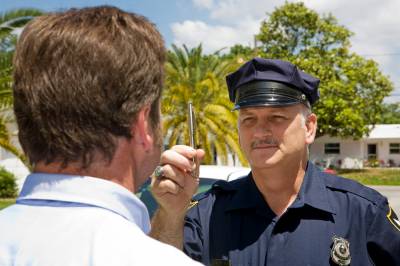 We’ve all seen TV shows and movies depicting people undergoing roadside sobriety testing; some of us have personally witnessed it. What are they doing? Is it scientific? Does it show whether one is under the influence of alcohol?
We’ve all seen TV shows and movies depicting people undergoing roadside sobriety testing; some of us have personally witnessed it. What are they doing? Is it scientific? Does it show whether one is under the influence of alcohol?
I’ve been handling DUI cases for over 35 years. In my opinion, these tests show whether a person can balance and whether one can multi-task. That’s it. What if a person does not do the tests perfectly? Sometimes this is obviously due to being drunk. Other times it is a person who has poor balance, or who has trouble multi-tasking in an anxiety-ridden roadside encounter with an officer who may just take them to jail.
Officers will commonly ask a person to walk a line. In addition to asking them to walk the line, they will announce other commands: stand in a certain fashion during the directions, don’t attempt the test during the directions, walk heel to toe, for a certain number of steps, keep your arms down at your side, turn in a certain fashion, count out loud, etc. You can walk the line perfectly – but turn in one motion instead of the little motions they told you to do and they’ll count that as one of two strikes; put your arm out more than six inches and that will be the other strike they were looking for. Disobey just two of the commands and they’ll come to court and say that shows you were drunk. In a perfect world, there will be audio and video of this so you can challenge the officer’s report of what occurred.
When Will a License Suspension Hearing Be Held After a California DUI?
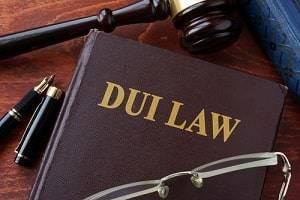
There are many violations that can lead to a motorist losing his or her driving privileges. For instance, being convicted of multiple moving violations, driving under the influence of drugs or alcohol (DUI), reckless driving, or other offenses are serious traffic infractions that could result in the suspension of a driver’s license. In California, a motorist who is arrested for DUI is subject to two separate types of proceedings: criminal and administrative. A criminal conviction can result in fines and/or jail time. The Department of Motor Vehicles (DMV) can also take away driving privileges through an administrative hearing. This can significantly impact a person’s daily life, especially if he or she needs a car to get to and from work. If you are facing DUI charges, it is imperative that you hire a skilled criminal defense attorney to help you prepare for your hearing and achieve the best possible outcome.
February 2021 Update: Santa Cruz Courts, DUI, DMV, and COVID-19

It has now been nearly a year since COVID-19 has entered the picture, and it has brought havoc to the criminal and traffic courts and the Department of Motor Vehicles (DMV) along with the rest of our society. On a good note, the driving under the influence (DUI) programs (often required for a defendant to take to alleviate a license suspension or as a condition of probation) are up and running. They are also proceeding by way of Zoom or similar remote appearance technology. This is quite helpful; in the early months of COVID, the programs were closed, and this caused major problems for some people trying to regain their driving privileges.
DMV has rolled forward with their hearings and insists that they be done by way of telephone. As for how this works when cross-examining an arresting officer? Showing a video to the DMV hearing officer? Other avenues to get one’s point across in a hearing? It does not work well at all. DMV does not seem to care much about these hurdles, and they continue to roll forward with their hearing procedures.
How Does Misdemeanor Diversion Affect California Criminal Cases?

On January 1, 2021, California Penal Code section 1001.95 became effective. Referred to as “misdemeanor diversion,” this new law allows a judge to grant diversion to a defendant even over the prosecutor’s objection. It is called a diversion because the criminal case is diverted from prosecution, and it reads as follows:
(a) A judge in the superior court in which a misdemeanor is being prosecuted may, at the judge’s discretion, and over the objection of a prosecuting attorney, offer diversion to a defendant pursuant to these provisions.
(b) A judge may continue a diverted case for a period not to exceed 24 months and order the defendant to comply with terms, conditions, or programs that the judge deems appropriate based on the defendant's specific situation.
(c) If the defendant has complied with the imposed terms and conditions, at the end of the period of diversion, the judge shall dismiss the action against the defendant.
All DMV Offices Will Open for Business Thursday, June 11 With Precautions Taken
The Department of Motor Vehicles will reopen all of its field offices on Thursday, easing the angst of thousands of drivers with expired licenses who have been unable to schedule appointments because of overloaded phone lines or closed offices.
All 169 field offices, opening for the first time since they were shut down at the end of March to prevent the spread of COVID-19, will be able to assist those with current appointments at a specific office and limited transactions that require an in-person visit.
“Fantastic,” said Cathy Meadows of San Jose, whose license expired May 8. “I still need to drive, at least, to and from the grocery store.”
Behind-the-wheel drive tests are not yet available, and the DMV warns that lines could be long and recommends that customers use its online services, expanded virtual services and other service channels to complete transactions, including eligible driver licenses and vehicle registration renewals.
What if I Can’t Afford a Private Attorney When Charged With a Crime in Santa Cruz?
 In California, when you are charged with a crime, you are entitled to have an attorney represent you in court. This can be a retained (hired) attorney, one whom you pay to go to court (and DMV) for you and help you wind your way through an often confusing situation. If you cannot afford to hire an attorney, you are not at all out of luck. The system provides criminal defense attorneys to help folks who cannot afford to hire private counsel, known as public defenders. Here in Santa Cruz, the public defenders are outstanding advocates for their clients. One often hears negative comments about public defenders in general - “just a government attorney,” “public pretender,” and “just another part of the system.” I can’t speak to areas where I don’t practice, but I can speak to the system in Santa Cruz, as I’ve been involved in it for over 35 years. The public defenders here are dedicated, intelligent, hard-working attorneys who zealously represent their clients. In short: they are outstanding attorneys.
In California, when you are charged with a crime, you are entitled to have an attorney represent you in court. This can be a retained (hired) attorney, one whom you pay to go to court (and DMV) for you and help you wind your way through an often confusing situation. If you cannot afford to hire an attorney, you are not at all out of luck. The system provides criminal defense attorneys to help folks who cannot afford to hire private counsel, known as public defenders. Here in Santa Cruz, the public defenders are outstanding advocates for their clients. One often hears negative comments about public defenders in general - “just a government attorney,” “public pretender,” and “just another part of the system.” I can’t speak to areas where I don’t practice, but I can speak to the system in Santa Cruz, as I’ve been involved in it for over 35 years. The public defenders here are dedicated, intelligent, hard-working attorneys who zealously represent their clients. In short: they are outstanding attorneys.
How Can a DUI Arrest Affect My Reputation?
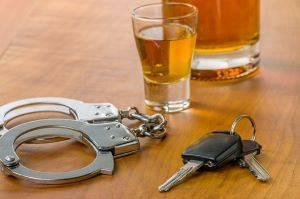 Drinking and driving is against the law, and an arrest for driving under the influence (DUI) can have a wide variety of negative consequences. In fact, even a first-time DUI can have far-reaching effects that may follow you for the rest of your life. If you are facing DUI charges, you will want to work with an experienced attorney to determine your best options for defense.
Drinking and driving is against the law, and an arrest for driving under the influence (DUI) can have a wide variety of negative consequences. In fact, even a first-time DUI can have far-reaching effects that may follow you for the rest of your life. If you are facing DUI charges, you will want to work with an experienced attorney to determine your best options for defense.
Effects of a DUI Charge
Following a DUI arrest, you may not fully understand your rights, and you may be unsure about what will happen during your case. A DUI charge can affect your life and your reputation in a variety of ways, including:
- Driver’s license suspension: Upon a DUI arrest, your license will typically be confiscated by law enforcement. Even if you are not formally charged or convicted of DUI, the Department of Motor Vehicles will issue an automatic driver’s license suspension. To contest this suspension, you must request an administrative hearing within 10 days after you receive notice of your license suspension.







